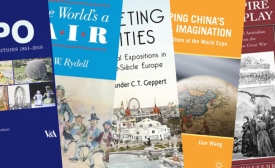soft power
LONDON — During the British general election Ed Miliband scored a hit that few noticed. In a speech at Chatham House he accused David Cameron of pursuing an “isolationist” foreign policy that has led to the “biggest loss of influence for our country in a generation.”
It may sell itself on feathers, wind machines and cheesy songs, but behind the sequins of the Eurovision Song Contest is a complex, carefully managed political game. With more than 40 countries competing, the host city of Vienna, Austria, is presently overflowing with politicians, diplomatic missions…

CPD highlights 5 of the most significant books on World Expos.
Four female koalas have just made their debut in front of an adoring public at Singapore Zoo – the latest in a long line of animals used for diplomatic purposes. [...] As Australian Foreign Minister Julie Bishop’s media release says, the koalas' visit will “further build on our long-standing constructive relationship”.
Premier Li Keqiang is bringing along another group on his trip to Latin America as he tries to increase China’s influence and soft power in the region – novelists. A special delegation will attend a seminar in Colombia on cultural exchanges between China and Latin America, the People’s Daily reported.
Stay for a while in Mizoram’s capital Aizawl and you start catching glimpses of South Korea. Travel around the state and the images emerge repeatedly ‒ in the clothes, the hair styles, even the furniture.
For proponents of targeted, or “smart,” sanctions, it was unquestionable proof of such punitive financial measures’ effectiveness as a foreign policy tool. They may be right. The unprecedented regime of UN, regional, and national sanctions leveled against Tehran was instrumental in slowing its progress toward nuclear weapons capability and bringing Iran’s leaders to the negotiating table.
Turkey's state-run broadcaster TRT (Turkish Radio and Television Corporation) has added an English-language channel to the stations it operates. TRT World, which will offer English news services around the clock, started its test broadcast on Monday after it was inaugurated by Deputy Prime Minister Yalçın Akdoğan.







